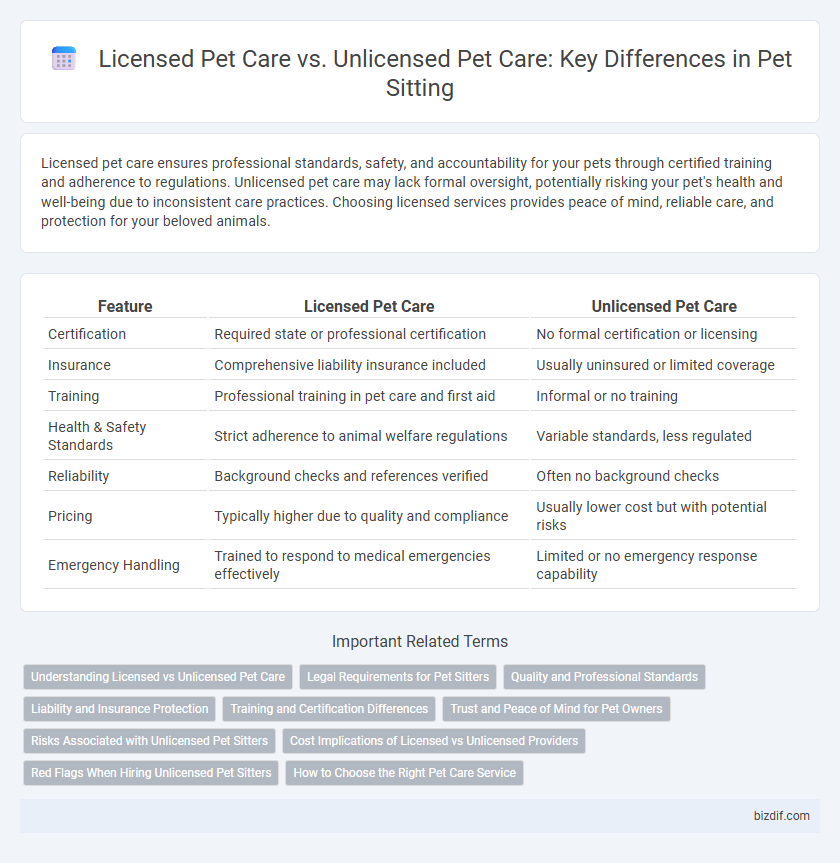Licensed pet care ensures professional standards, safety, and accountability for your pets through certified training and adherence to regulations. Unlicensed pet care may lack formal oversight, potentially risking your pet's health and well-being due to inconsistent care practices. Choosing licensed services provides peace of mind, reliable care, and protection for your beloved animals.
Table of Comparison
| Feature | Licensed Pet Care | Unlicensed Pet Care |
|---|---|---|
| Certification | Required state or professional certification | No formal certification or licensing |
| Insurance | Comprehensive liability insurance included | Usually uninsured or limited coverage |
| Training | Professional training in pet care and first aid | Informal or no training |
| Health & Safety Standards | Strict adherence to animal welfare regulations | Variable standards, less regulated |
| Reliability | Background checks and references verified | Often no background checks |
| Pricing | Typically higher due to quality and compliance | Usually lower cost but with potential risks |
| Emergency Handling | Trained to respond to medical emergencies effectively | Limited or no emergency response capability |
Understanding Licensed vs Unlicensed Pet Care
Licensed pet care providers comply with regulations ensuring trained, insured, and bonded services, promoting higher safety standards and accountability. Unlicensed pet care may lack formal training and oversight, increasing risks related to pet health and well-being. Understanding the differences helps pet owners make informed decisions prioritizing their pets' safety and quality of care.
Legal Requirements for Pet Sitters
Licensed pet care providers comply with state and local regulations, ensuring adherence to mandatory certifications, vaccinations, and insurance policies that protect both pets and owners. Unlicensed pet sitters may lack formal training and fail to meet legal standards, increasing risks of liability and pet safety issues. Understanding and verifying licensing requirements is crucial for pet owners to guarantee professional care and avoid legal complications.
Quality and Professional Standards
Licensed pet care providers adhere to strict regulatory standards, ensuring higher quality and consistent professional services such as health monitoring, emergency response, and hygiene management. Unlicensed pet care often lacks formal training and accountability, increasing risks related to pet safety, behavioral issues, and inconsistent care routines. Choosing licensed pet sitters guarantees adherence to ethical practices, verified qualifications, and insurance coverage that protect both pets and owners.
Liability and Insurance Protection
Licensed pet care providers offer comprehensive liability and insurance protection, safeguarding both pets and owners against unforeseen incidents. Unlicensed pet sitters often lack formal insurance coverage, exposing clients to potential financial risks in case of injury, property damage, or pet illness. Choosing licensed pet care ensures compliance with industry standards and minimizes liability through verified insurance policies.
Training and Certification Differences
Licensed pet care providers undergo rigorous training programs and obtain certifications such as Pet First Aid, CPR, and animal behavior courses, ensuring compliance with industry standards and legal regulations. Unlicensed pet care providers often lack formal education and certifications, which can result in inconsistent care quality and increased risks for pets. Certification not only validates skills but also boosts pet owners' confidence in the sitter's ability to handle emergencies and specialized pet needs.
Trust and Peace of Mind for Pet Owners
Licensed pet care providers undergo rigorous training and background checks, ensuring reliable and professional handling of your pets. They adhere to established standards and regulations that guarantee your pet's safety and well-being, offering greater trust and peace of mind. Unlicensed pet care may lack these formal assurances, potentially increasing risks and leaving owners uncertain about the quality of care.
Risks Associated with Unlicensed Pet Sitters
Unlicensed pet sitters often lack formal training and certification, increasing the risk of inadequate care, mishandling, or failure to recognize pet health issues. Without proper credentials, these providers may not adhere to established safety protocols or liability standards, potentially endangering pets' wellbeing. Choosing licensed pet care ensures compliance with industry regulations, professional accountability, and a higher standard of pet health and safety.
Cost Implications of Licensed vs Unlicensed Providers
Licensed pet care providers often charge higher rates due to regulatory compliance, insurance coverage, and professional training, which ensures quality and reliability. Unlicensed pet care services typically offer lower prices but may lack verified qualifications, potentially increasing risks and liability. Investing in licensed pet care can reduce unforeseen costs related to pet health or damage, offering better long-term value despite the initial expense.
Red Flags When Hiring Unlicensed Pet Sitters
Hiring unlicensed pet sitters may pose significant risks such as lack of verified experience, inadequate emergency handling skills, and absence of liability insurance, which can endanger your pet's safety. Red flags include refusing to provide references, avoiding written contracts, and no formal background checks, indicating unprofessionalism and potential unreliability. Licensed pet care professionals adhere to stringent standards and certification requirements, ensuring qualified, trustworthy, and accountable services.
How to Choose the Right Pet Care Service
Choosing the right pet care service involves evaluating whether the provider is licensed, ensuring compliance with local regulations and professional standards for animal welfare. Licensed pet care services demonstrate verified training, background checks, and insurance, providing greater reliability and safety for pets. Unlicensed services may offer lower costs but often lack guaranteed expertise, posing potential risks to pet health and well-being.
Licensed pet care vs Unlicensed pet care Infographic

 bizdif.com
bizdif.com